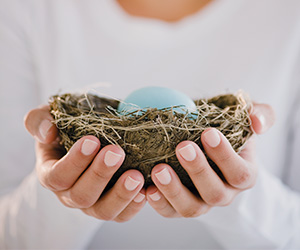Struggling to have a child of your own can be crushing. Cindy Tilney chats to two moms about their journey with infertility
 Roughly a decade ago, I was sitting on the beach watching the sun sink into the horizon when my phone rang, the screen lighting up the name of a close friend, Emma*. When I answered, I could hardly make out what she was saying through her tears, but it didn’t take much for me to figure it out – I knew she’d had an appointment scheduled that day to determine the outcome of her third round of IVF (in vitro fertilisation), and judging by her reaction, the news had not been good.
Roughly a decade ago, I was sitting on the beach watching the sun sink into the horizon when my phone rang, the screen lighting up the name of a close friend, Emma*. When I answered, I could hardly make out what she was saying through her tears, but it didn’t take much for me to figure it out – I knew she’d had an appointment scheduled that day to determine the outcome of her third round of IVF (in vitro fertilisation), and judging by her reaction, the news had not been good.
‘I feel like a failure as a woman,’ she sobbed into the phone, an ironic statement coming from one of the most maternal people I know. Emma had always loved children and had a wonderful way with them – a gift she employed regularly in her work at an NGO for underprivileged youth. But she’d always dreamt of having her own kids, and being unable to conceive was a devastating blow for her.
The options
According to Dr Sascha Edelstein, the treatment for infertility will vary depending on the diagnosis.
The first step for couples battling infertility is to have the relevant tests to establish whether it is a medical condition. And at the same time, the specialist will address certain lifestyle issues with the couple.
‘If age is not a concern, we will often encourage couples to spend time resolving key lifestyle factors before trying procedures such as AI (artificial insemination) or IVF.
‘But for women over 35, time is of the essence,’ he explains. ‘Weight, psychological stress, diet, smoking, exercise, exposure to environmental pollutants, and caffeine and alcohol intake can all affect fertility.’
The course of treatment chosen can range from taking tablets that will induce ovulation, to artificial insemination (in which sperm cells are injected into the womb, where fertilisation takes place) and in vitro fertilisation, in which egg cells are harvested from the body and then fertilised with sperm in a laboratory, before being transferred back into the womb, where they develop.
Emotional costs
Tertia Albertyn experienced infertility for many years owing to polycystic ovary syndrome (PCOS), a condition in which eggs don’t reach maturity but are trapped inside protective, fluid-filled ‘follicles’ in the ovaries.
‘IVF puts an enormous strain on you, individually and as a couple, and physically as well as emotion-ally,’ she says. ‘There’s often a sense of feeling broken, or not being good enough, because there’s something so many other people can do that you can’t. Added to that is the guilt that comes from feeling you are letting your partner down.
‘With every round of IVF, there’s a cycle of hope and disappointment that can be crushing – each time you embark on the process again, you start to picture what your baby might look like and imagine your family – only to have those dreams come crashing down around you when you don’t fall pregnant.’
Ticking clock
For many people, having children is part of a basic identity issue; it’s something they feel they’re simply supposed to do. The loss of that fantasy, and coming to terms with the fact that you may not be able to have a child in the manner you thought you would, can be tough.
‘I became so bitter and angry, but didn’t know who or what I was angry at – life, fate, nature – I was mad at everything and nothing,’ says Tertia. ‘And because I couldn’t direct those feelings, I internalised them. That bitterness was perhaps the worst part of the experience, and it drove me to a therapist.’
Counselling was one of three key steps helping her, she says, along with antidepressants and bonding with other people also struggling with infertility.
When Tertia was going through IVF, there weren’t any local infertility support forums, so she had to rely on international online support, which changed her life. ‘I went from feeling isolated to suddenly being part of a community that understood me and what I was going through.’
Tertia’s dream of having children was finally realised: on her ninth IVF attempt, she fell pregnant – with twins. Ironically, Tertia fell pregnant three times, naturally, following the twins’ birth, although she miscarried twice. She gave birth to her third child in 2008.
Her experience made her very passionate about supporting those going through similar experiences, and she’s since started Fertilicare, a local online forum for couples and individuals battling infertility.
The road less travelled
For a combination of emotional, physical and financial reasons, Emma decided not to continue with IVF after that third attempt, although the decision was not an easy one. But the path she has taken, while different to what she once believed it would be, has been a remarkable one.
Shortly after stopping IVF, she and her husband moved to the US, where they began the adoption process. After waiting a year, they adopted Lily, whose parents could not afford to keep her.
One year later, while waiting to adopt a second child, the agency contacted them to tell them Lily’s parents had given birth to another child, who they were also giving up. To cut a long story short, Sean* and Emma are now proud parents of two biological sisters.
It’s funny how things just work out sometimes, isn’t it?
Facts and factors
‘Infertility is officially defined as the inability to conceive after one year of regular unprotected intercourse, with an estimated prevalence of around 15% in the general population,’ says fertility specialist and medical director of Hart fertility clinic, Dr Sascha Edelstein. It’s estimated that men and women each play roughly a 40% role in fertility issues, while the remaining 20% of cases still remain a mystery, he adds.
There are three broad medical reasons why a couple may struggle to conceive:
1 Anovulation If a woman is not ovulating (releasing an egg) every month. Symptoms include either irregular or completely absent menstrual cycles.
2 Pelvic/tubal factor If the fallopian tubes are damaged and the sperm is unable to reach the egg to fertilise it.
3 Male factor If the sperm are unable to fertilise the egg.
*Name has been changed.







